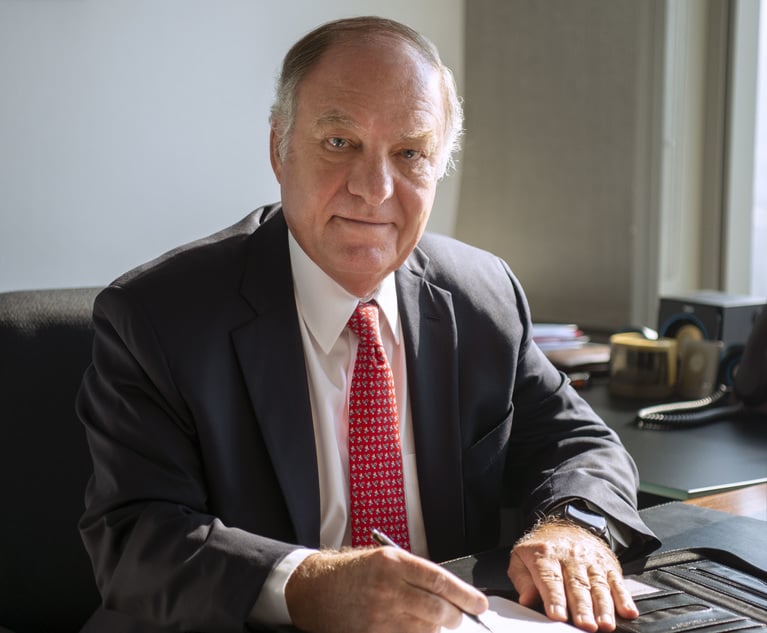Libor Transition: 'The Risk of Litigation is Very Real'
Lawyers anticipate a rise in disputes as the lending rate benchmark is phased out.
January 17, 2020 at 07:06 AM
4 minute read
 The scandal-hit London Inter-bank Offered Rate will be replaced by 2022.
The scandal-hit London Inter-bank Offered Rate will be replaced by 2022.
The U.K.'s transition away from using Libor, the agreed interest rate at which banks lend to each other, is set to generate a flood of disputes, leading legal advisers believe.
Market regulator the Financial Conduct Authority released a set of documents outlining the transition plan on Thursday, with the scandal-ridden benchmark rate set to be phased out by the end of 2021.
But lawyers think the changeover to new benchmarks will create a rise in litigation.
"With such large amounts of money at stake, across the spectrum of financial products – including loans, bonds and derivatives – the risk of litigation is very real," said Chris Ross, banking and finance partner at RPC.
"The outstanding stock of Libor instruments has grown substantially since the Bank of England confirmed the shift to [new benchmark rate] Sonia which just adds to the complexity of the transition.
"If a contract is switched from Libor to Sonia then there is a very high chance that one party or other will lose out – the only question is how big that difference will be."
Speaking to Law.com's U.K. arm Legal Week, Hogan Lovells partner Arwen Handley agreed that the transition from Libor is a "massive undertaking" as the rate is "so entrenched in so many aspects of business".
"There will inevitably be an increase in disputes", Handley continued. "If firms don't prepare, they will be caught short and in quite a bit of trouble".
"With all the moving parts and uncertainty, you can see potential for all kinds of issues"
"A lot of firms have got massive transaction projects on the go, and with two years to go people will have made great strides", she added. "But there will still be areas that are difficult. With all the moving parts and uncertainty, you can see potential for all kinds of issues."
Libor is based on bank estimates of lending rates according to transaction history and also including other factors, but other benchmarks are based solely transaction history, which may cause problems, according to Handley.
"You're moving the whole market from a reliance on Libor, to a backward looking rate which is fairly and squarely based on actual transactions, and which doesn't incorporate credit risk", Handley said. "What's right on some instruments might not work on others".
"People have to come up with the answer and if they can't agree, they'll have to litigate"
Christopher Kandel, finance partner at Morrison & Foerster said that the FCA's announcement demonstrates that "this [transition] is definitely going to happen".
With all benchmarks however, there are complexities regarding the time period and the level of credit risk involved.
Kandel added that "U.S. loans have other interest rate options such as base rate, federal funds rate and the like that make disputes there less likely". In Europe however, the interest options in loans has traditionally been Libor or the lender's cost of funds where Libor is unavailable. Kandel explained that deviation from this "originally required the consent of all lenders (and the borrower) to modify by amendment."
He highlighted that the derivatives market is moving quicker towards using overnight rates, while the European loan market is sticking with Libor, with the main focus on "making the circumstances in which that amendment happens easier to trigger".
"What it would and should be amended to is the open question in Europe, and that is what I am not seeing any progress on in the loan world in Europe.
"It likely will be a risk free rate plus something (the credit and possibly time spread), and it is the 'something' where I have seen no progress in the market agreeing what that should be."
He said it is "hard to tell if legal disputes will be high", but "people have to come up with the answer and if they can't agree, they'll have to litigate".
This content has been archived. It is available through our partners, LexisNexis® and Bloomberg Law.
To view this content, please continue to their sites.
Not a Lexis Subscriber?
Subscribe Now
Not a Bloomberg Law Subscriber?
Subscribe Now
NOT FOR REPRINT
© 2025 ALM Global, LLC, All Rights Reserved. Request academic re-use from www.copyright.com. All other uses, submit a request to [email protected]. For more information visit Asset & Logo Licensing.
You Might Like
View All
Carey Abogados’ Senior Partner Becomes New Head of IBA, First Chilean to Assume Role of President

Goodwin Hires Quinn Emanuel Antitrust Partner to Launch Brussels Office
3 minute read
Claus von Wobeser: Mexico's ‘Godfather of Arbitration’ Becomes Firm’s Honorary Chair

Jenner & Block Expands London Team with Baker McKenzie Hire to Lead New Practice Area
2 minute readTrending Stories
- 1Court Rejects San Francisco's Challenge to Robotaxi Licenses
- 2'Be Prepared and Practice': Paul Hastings' Michelle Reed Breaks Down Firm's First SEC Cybersecurity Incident Disclosure Report
- 3Lina Khan Gives Up the Gavel After Contentious 4 Years as FTC Chair
- 4Allstate Is Using Cell Phone Data to Raise Prices, Attorney General Claims
- 5Epiq Announces AI Discovery Assistant, Initially Developed by Laer AI, With Help From Sullivan & Cromwell
Who Got The Work
J. Brugh Lower of Gibbons has entered an appearance for industrial equipment supplier Devco Corporation in a pending trademark infringement lawsuit. The suit, accusing the defendant of selling knock-off Graco products, was filed Dec. 18 in New Jersey District Court by Rivkin Radler on behalf of Graco Inc. and Graco Minnesota. The case, assigned to U.S. District Judge Zahid N. Quraishi, is 3:24-cv-11294, Graco Inc. et al v. Devco Corporation.
Who Got The Work
Rebecca Maller-Stein and Kent A. Yalowitz of Arnold & Porter Kaye Scholer have entered their appearances for Hanaco Venture Capital and its executives, Lior Prosor and David Frankel, in a pending securities lawsuit. The action, filed on Dec. 24 in New York Southern District Court by Zell, Aron & Co. on behalf of Goldeneye Advisors, accuses the defendants of negligently and fraudulently managing the plaintiff's $1 million investment. The case, assigned to U.S. District Judge Vernon S. Broderick, is 1:24-cv-09918, Goldeneye Advisors, LLC v. Hanaco Venture Capital, Ltd. et al.
Who Got The Work
Attorneys from A&O Shearman has stepped in as defense counsel for Toronto-Dominion Bank and other defendants in a pending securities class action. The suit, filed Dec. 11 in New York Southern District Court by Bleichmar Fonti & Auld, accuses the defendants of concealing the bank's 'pervasive' deficiencies in regards to its compliance with the Bank Secrecy Act and the quality of its anti-money laundering controls. The case, assigned to U.S. District Judge Arun Subramanian, is 1:24-cv-09445, Gonzalez v. The Toronto-Dominion Bank et al.
Who Got The Work
Crown Castle International, a Pennsylvania company providing shared communications infrastructure, has turned to Luke D. Wolf of Gordon Rees Scully Mansukhani to fend off a pending breach-of-contract lawsuit. The court action, filed Nov. 25 in Michigan Eastern District Court by Hooper Hathaway PC on behalf of The Town Residences LLC, accuses Crown Castle of failing to transfer approximately $30,000 in utility payments from T-Mobile in breach of a roof-top lease and assignment agreement. The case, assigned to U.S. District Judge Susan K. Declercq, is 2:24-cv-13131, The Town Residences LLC v. T-Mobile US, Inc. et al.
Who Got The Work
Wilfred P. Coronato and Daniel M. Schwartz of McCarter & English have stepped in as defense counsel to Electrolux Home Products Inc. in a pending product liability lawsuit. The court action, filed Nov. 26 in New York Eastern District Court by Poulos Lopiccolo PC and Nagel Rice LLP on behalf of David Stern, alleges that the defendant's refrigerators’ drawers and shelving repeatedly break and fall apart within months after purchase. The case, assigned to U.S. District Judge Joan M. Azrack, is 2:24-cv-08204, Stern v. Electrolux Home Products, Inc.
Featured Firms
Law Offices of Gary Martin Hays & Associates, P.C.
(470) 294-1674
Law Offices of Mark E. Salomone
(857) 444-6468
Smith & Hassler
(713) 739-1250








